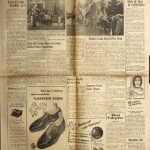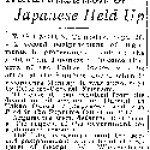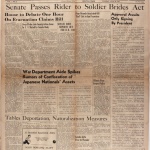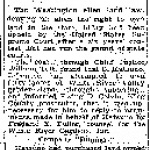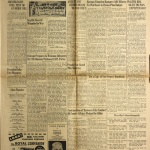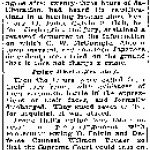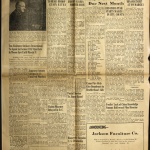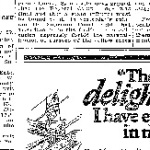Regan v. King
The 1942-43 federal court case Regan v. King , which arose out of a lawsuit by the American Legion and the Native Sons of the Golden West to disenfranchise American citizens of Japanese origin, marks a landmark in legal struggles for civil rights. Not only did the court's decision reaffirm the principle of birthright citizenship of all Americans, but the common involvement of African American and Japanese American lawyers marked the origin of the postwar alliance for civil rights between the two groups.
In May 1942, following the military roundup of 112,000 West Coast Japanese Americans under Executive Order 9066 , the Native Sons of the Golden West, a California fraternity that had led the prewar movement for Japanese exclusion, held their 65th Grand Parlor (convention). There the Native Sons officially voted resolutions to strip Japanese Americans of citizenship: "first to prosecute, then to carry through to the Supreme Court of the United States, if necessary, a suit challenging the United States citizenship of the Japanese; and second to draft and sponsor an amendment to the Constitution of the United States which shall have for its object the exclusion of all persons of Japanese ancestry from American citizenship."
With support from the Native Sons and the American Legion, John T. Regan, longtime Grand Secretary of the Native Sons, sued Cameron King, registrar of voters in San Francisco County, to remove 90 named Nisei from the voting rolls for the August 1942 primaries and to bar them from voting for the duration of the war. Though ostensibly the lawsuit touched only on voting rights, its avowed purpose was to overturn the 1898 Wong Kim Ark Supreme Court decision, which established the principle of citizenship for all U.S.-born persons. U.S. Webb, longtime California attorney general, agreed to act as counsel for the Native Sons. In addition, incumbent Attorney General Earl Warren , who was running for governor, pledged his support.
The Regan case was argued in Federal District Court in June 1942. U.S. Webb told Judge Adolphus St. Sure that the case "involves the citizenship and right to citizenship of all peoples and all races who do not fall within the characterization or description of white people." He then made an argument that rested unabashedly on principles of white supremacy, stating that the Declaration of Independence and the Constitution were made entirely "by and for white people." On July 2, 1942, Judge St. Sure issued his decision in Regan v. King , rejecting the Native Sons' plea by reference to Wong Kim Ark . Webb then appealed the case to the 9th Circuit Court of Appeals.
The appeal catalyzed the intervention of the Japanese American Citizens League (JACL). During spring 1942 JACL leaders reluctantly decided not to challenge removal, and to offer the federal government their cooperation, a policy that earned them widespread hatred among Nisei. Yet they claimed they were not giving up permanent rights. Regan v. King concerned them because it involved such rights. Still, JACL leaders seem not to have considered any intervention until the organization held a conference in mid-November 1942. A.L. Wirin of the Southern California American Civil Liberties Union (ACLU) spoke briefly about Regan , and suggested that in case of an appeal the JACL might want to intervene. Some time later, the JACL approved the preparation of an amicus in opposition to the Native Sons by National President Saburo Kido and past president Walter Tsukamoto . However, both Kido and Tsukamoto were confined in camps, far from law libraries and proper office facilities. Thus, doubtless at Wirin's suggestion, they reached out to his colleague in the Wakayama case, Hugh Macbeth , who agreed to work with the JACL. Macbeth then recruited the NAACP's Southern California branch president, Thomas L. Griffith.
The JACL's amicus , which listed Kido, Tsukamoto, Macbeth, Griffith and Wirin as counsel, was filed on February 17, 1943. It asserted that the Native Sons' case was in fact directed at many other groups, including American Indians and all Americans of Asian ancestry. The brief then moved on to explore what it termed the "Interests of Negroes and this case." In this section—likely drafted by Hugh Macbeth—the brief ridiculed the disingenuous suggestion of the Native Sons that the citizenship of African Americans were not in question, and added that if the lawsuit was successful, the Native Sons would next campaign to deprive Negroes of citizenship." [1]
The case of Regan v. King was set down for oral argument before the 9th Circuit Court of Appeals on February 19, 1943, the very same day the Court considered the appeals in the Korematsu , Hirabayashi , and Yasui cases. [2] US Webb made a 30-minute presentation of his appeal. He again stated that "without committing treason" it was his contention that Wong Kim Ark had been "erroneously decided." Walter Dodd rose to take the defense case, with A.L. Wirin waiting to present the JACL position. However, once Webb finished his case, the judges engaged in a whispered conference on the bench. Speaking on behalf of the court, Judge Curtis stated, "It is not necessary for the court to hear further argument. The decision of the lower court is sustained." [3] The Court then called the other cases, which occupied the rest of the day's proceedings. [4] Webb made a last desperate appeal to the Supreme Court. However, on May 17, 1943, the Court officially declined to hear Regan . The case was dead.
The failure of the lawsuit in Regan preserved the rights of all Americans to birthright citizenship from challenge. Meanwhile, the events provide insight into the JACL's wartime actions. The JACL's leadership in the Regan v. King case suggests that its leaders supported removal as a temporary war expedient, and worked to defend permanent citizenship rights. At the same time, the lawsuit brought Black leaders to take cognizance, often for the first time, of the racial nature of the discrimination against Nisei. The central involvement of African American lawyers as counsel and as partners in the drafting of the JACL's amicus brief underlines the importance of Regan as a pioneering instance of multiracial coalition-building.
For More Information
Robinson, Greg. "The Last Time that Birthright Citizenship Was 'Reconsidered.'" The Faculty Lounge, August 9, 2010. http://www.thefacultylounge.org/2010/08/page/3/ . [five parts.]
Footnotes
- ↑ Brief on Behalf of the Japanese American Citizens League, amicus curiae, John T. Regan v. Cameron King , February 17, 1943, p. 47.
- ↑ "'Jap Day' in Court," San Francisco Chronicle , February 19, 1943, 13.
- ↑ "U.S. Japanese Must be Allowed to Vote."
- ↑ Lawrence E. Davies, "Upholds Japanese in Citizens' Right," New York Times , February 21, 1943, 23.
Last updated Jan. 30, 2024, 1:13 a.m..

